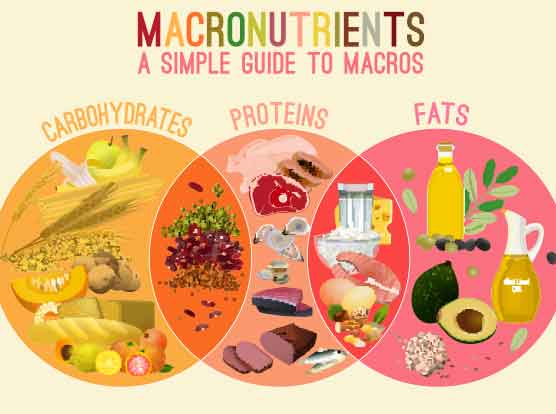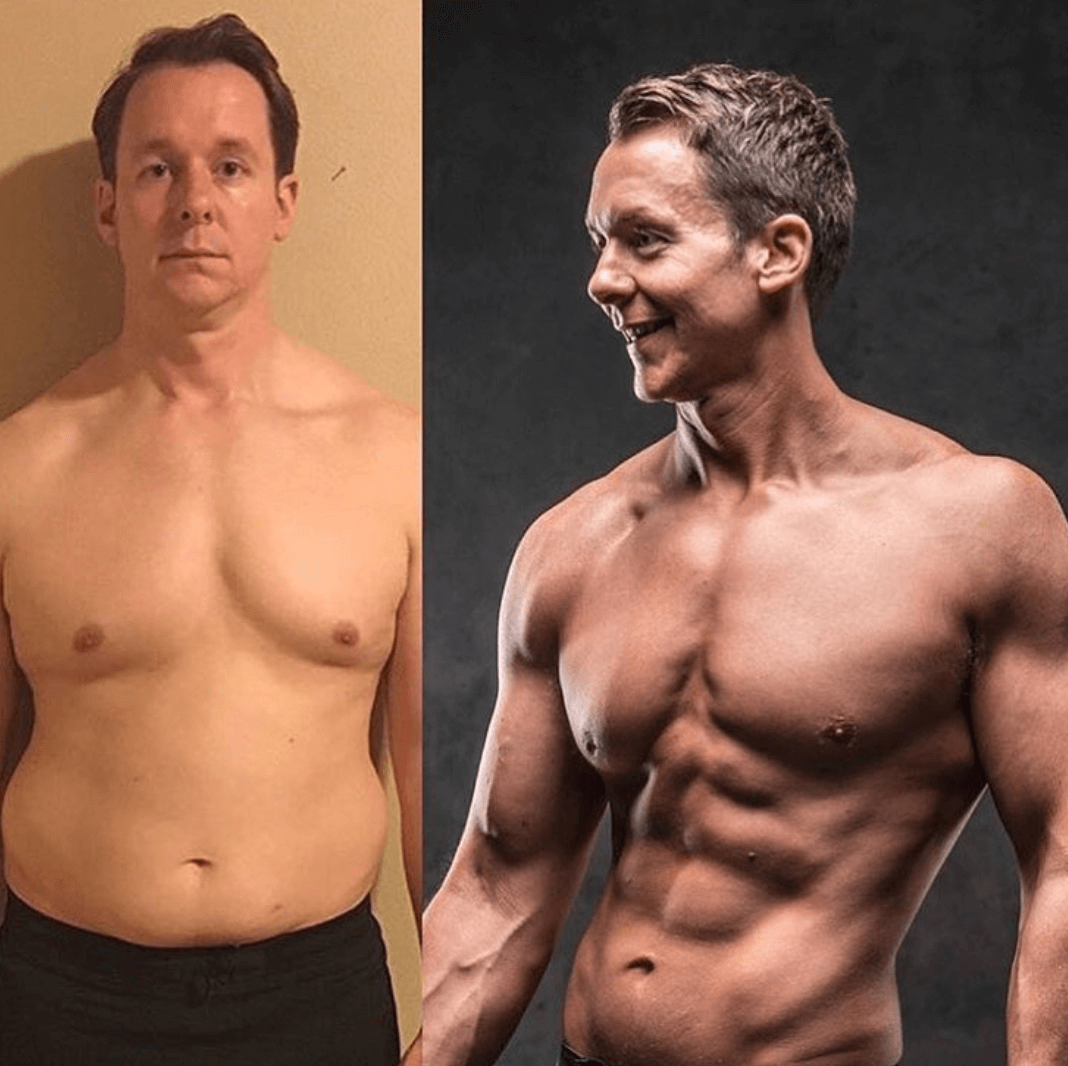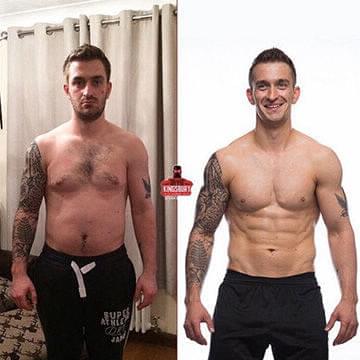Macronutrients, or macros for short, are the fuel in your food which your body needs to keep itself going. When you hear people talking about macros, they are usually just talking about our three sources of energy: fat, protein and carbohydrates.
Why do they matter?
Whilst the total number of calories you eat is responsible for weight change, the relative amount of each macro in those calories influences changes in body composition and athletic performance.
The right balance of macros for you is determined by your goals and lifestyle. Muscle builders should focus on getting a good amount of protein. If your goal is to lose weight and get lean, aiming to reduce your carb intake, especially sugars, is a good start. If you exercise a lot or are a long distance cyclist/runner, you’ll probably want to include a wide range of carbs in your diet.
Getting the macro balance right for your goals will make your goals much easier to achieve.
Protein
A good place to start when thinking about macros in your diet is protein. Protein is made of amino acids, which are required almost everywhere in your body. If you don’t eat enough protein, your body will start to break down muscle in your body to create its own.
The easiest sources of protein are meats. Low fat meat such as chicken and turkey are especially good sources of protein as they contain very little fat or carbs, but fish and red meats are also very high in protein. It’s not all meat though; there’s plenty of veggie sources of protein, such as dairy products, egg whites, Quorn, certain grains and pulses like lentils and chickpeas, and soy products such as black bean spaghetti, edamame, tempeh and tofu.
How much protein?
The UK recommended minimum intake of protein is about 10% of calories from protein, but this is the bare minimum to remain healthy. I would recommend eating a lot more than 10% protein, especially if you are trying to build or retain muscle. As muscles are made of protein, if you aren’t eating enough protein, you won’t be able to grow muscle.
Studies suggest that consuming 1.5-3g of protein per kg of bodyweight is a good amount if you’re trying to build muscle[1][2]. This works out to about 20-50% of calories from protein.
Protein has also been shown to be filling[3], so if you’ve got a big appetite, eating a lot of protein will help prevent you from getting hungry again too soon.
100g of protein contains 400 calories. 100g of chicken breast contains about 30g of protein (and 3g of fat), working out to 120 calories of protein (and about 30 calories of fat).
Carbohydrates
Carbs get a bit of a bad rep in the fitness world, but as far as your body is concerned, carbs are the fastest and easiest form of fuel available. There’s two types of carbs: complex carbs and sugars.
Sugars are carbs which your body finds it really easy to utilise. They burn quickly but don’t last long. This makes them a great form of fuel if you’re exercising hard. However, eat too much and your body converts the excess to fat.
Complex carbs are the carbs found in grains, pasta and pulses. These are slower to burn with a steadier release of energy. When you’re exercising, mixing up your carbs is a great way to keep yourself fuelled for longer.
Carbs, especially sugars, are really tasty, but unfortunately not very filling and they’re simply not good for you in large quantities[4]. Unless you’re exercising very hard, I would recommend not getting more than 5% of your daily calories from sugar, and ideally much less than that.
As carbs are less filling, it’s easy to eat too many carbs and put on weight. Also, a number of studies have shown that on identical calorie intakes, people with a lower carb content in their diet tend to lose weight more quickly, often by as much as 20% faster[5][6].
100g of carbs contains about 400 calories. Grains like rice contain about 30g of carbs per 100g, so 100g of rice contains about 120 calories.
Fat
Fat is even slower burning than complex carbs. It’s the last thing your body would choose to burn, which is why it can be so hard to lose it. Fats also help you absorb certain vitamins and there’s evidence that getting enough fat in your diet can boost your immune system[7] and improve brain function[8].
Fat can be found in meats, fish, nuts and seeds, oils, egg yolks, cream and avocados, which is why avocados taste so good.
Fats come in three main flavours: saturated, unsaturated and trans-fats. Unsaturated fats tend to be liquid at room temperature (like the oils in avocado, nuts and olives), while saturated fats tend to be solid at room temperature (such as coconut oil, butter and fatty meats). Trans-fats (with some exceptions) are artificial fats made to last longer. These are found in heavily processed foods like cookies and doughnuts, and are commonly used for deep fat frying.
Research has shown that people with more saturated fats in their diet tend to have a higher risk of heart disease[9], so most health bodies recommend eating unsaturated (liquid) fats, especially those found in fish and nuts, over saturated (solid) fats.
Trans-fats should be avoided at all costs. There’s a wealth of research showing how awful these fats are for your health[10] and there’s been talk of banning them outright in the UK for years[11] (they were banned in the US in 2018[12]).
100g of fat (whichever the type) contains about 900 calories. This makes fat far and away the most calorie dense of the macros, and explains why 100g of nuts contains more calories than 100g of pure sugar (600 calories compared to 400 calories).
How to calculate your macros
Calculating your macros can be a little tricky, but it is well worth the effort. There’s plenty of online trackers available which will give you the macro breakdown of your foods. Almost all foods in the supermarket also tell you the calorie content of carbs, protein and fats, so you can work it out for yourself.
If you know the weight of the macros, you can calculate the calorie content as follows:
Protein and Carbs: 4 calories per gram
Fat: 9 calories per gram
There is a fourth macro: Alcohol. I recommend drinking as little as possible to improve health and fitness, but if you want to drink a little, include alcohol in your carb allowance. 1 gram of alcohol contains 7 calories, so a unit of alcohol contains about 70 calories, a pint of beer (3 units) is about 210 calories and a double whisky (2 units) is 140 calories.
Sustainability and Enjoyment
As with all diets and meal plans, whatever you do needs to be enjoyable and sustainable. If you’re looking to cut calories, increasing protein intake is, in general, more satisfying. This is therefore more sustainable than a high carb diet.
But you really need to do what works for you. Hitting your macro targets does take a bit of patience and time at first, but I promise it does get easier. However, if you find sticking tightly to a macro plan is exhausting, too time consuming, or simply boring, focus on getting your calories right first. A plan which is not enjoyable simply will not last (unless you have incredible dedication).
I’d also recommend not doing it alone. Get your partner or a friend involved too. Share recipes or take turns cooking. This takes the load off you and makes it much more likely you’ll stick to the plan.
And if you want me to do all the hard work for you, get in touch and we can discuss one of my plans, with pre-designed meals and snacks, hitting specific macro targets.










